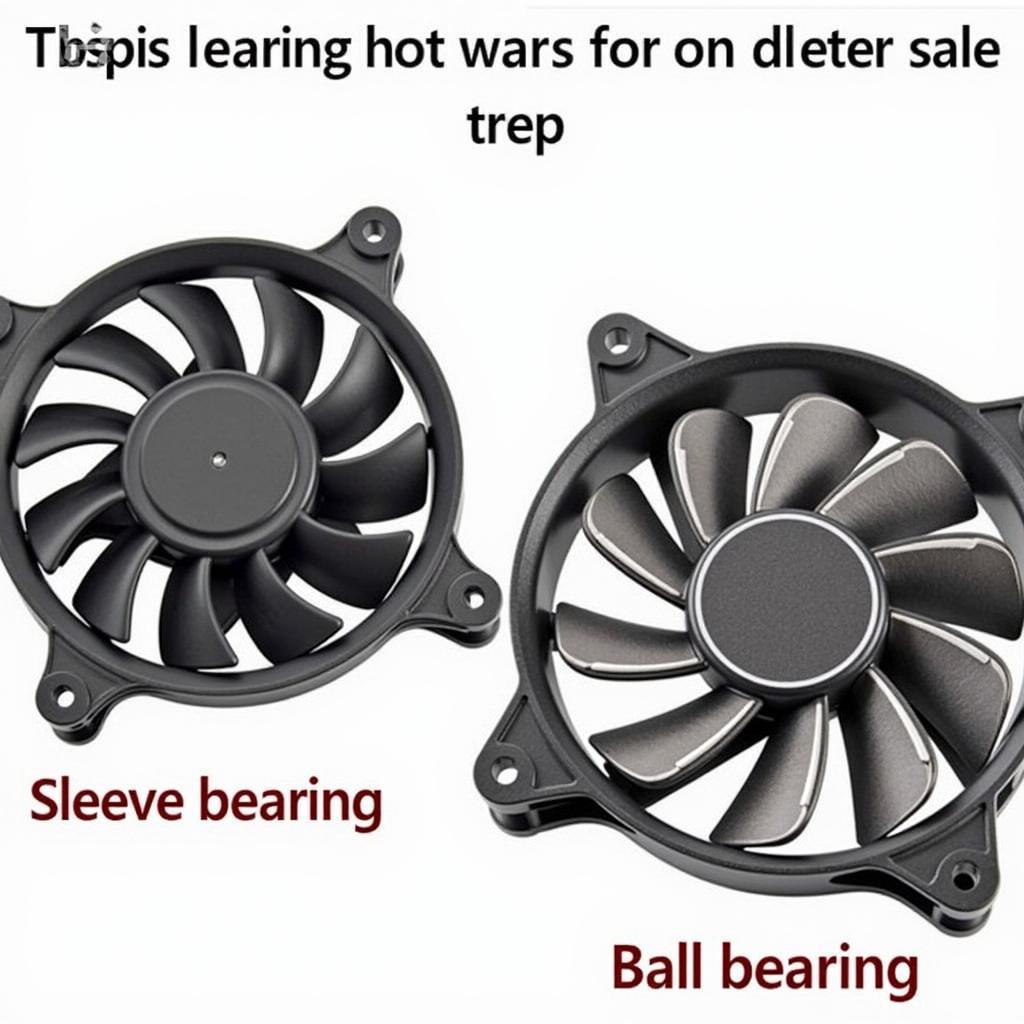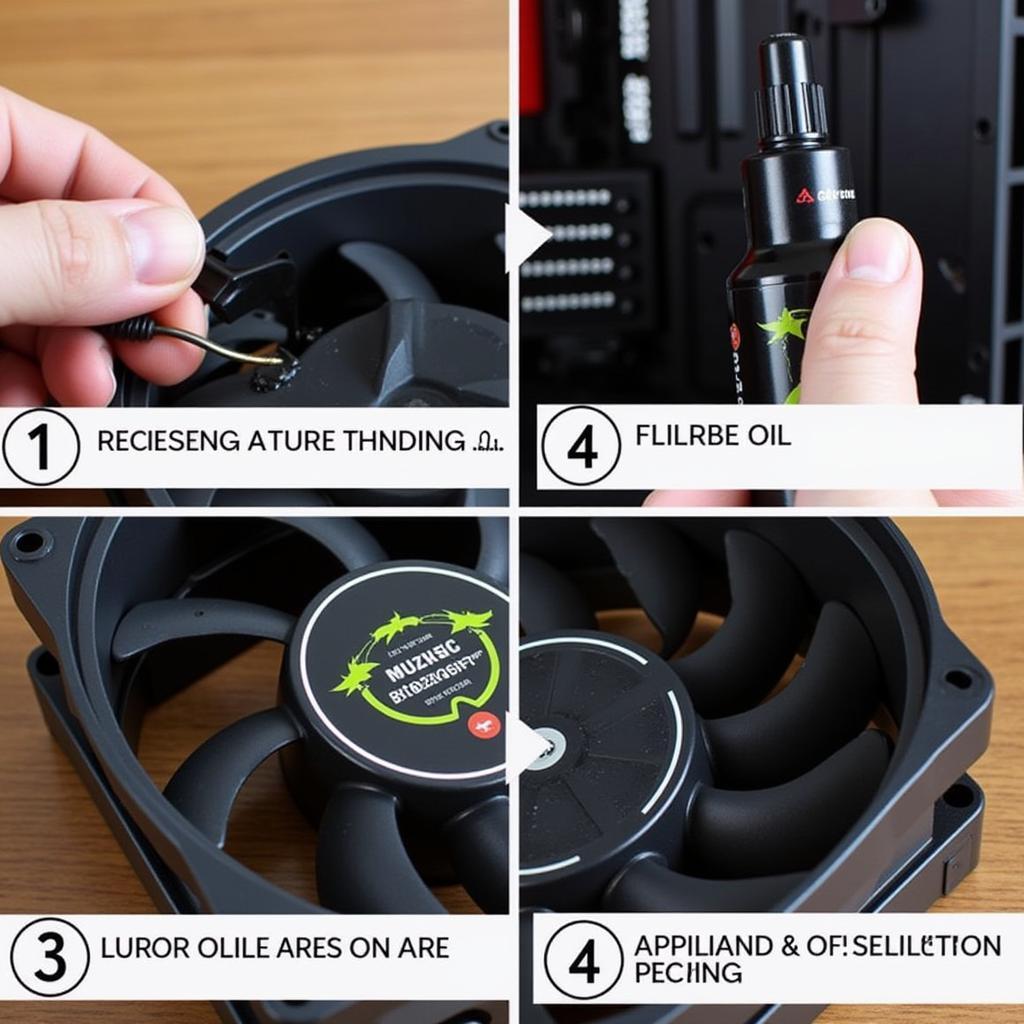PC case fans are crucial for maintaining a healthy temperature inside your computer, preventing overheating and ensuring optimal performance. But do these unsung heroes of your system require regular oiling like other mechanical components? Let’s dive into the intricacies of PC case fan maintenance and explore the question of lubrication.
Understanding PC Case Fan Mechanisms
Modern PC case fans primarily utilize two types of bearings: sleeve bearings and ball bearings. Sleeve bearings are simpler and more cost-effective, relying on a porous sleeve lubricated with oil to reduce friction. Ball bearings, on the other hand, use small metal balls within a race, offering smoother operation and longer lifespan. The type of bearing significantly influences whether your fan needs oiling.
Sleeve Bearing Fans and Lubrication
Sleeve bearing fans are more prone to wear and tear due to the direct contact between the shaft and the sleeve. The oil within the sleeve gradually dries out over time, increasing friction and noise, and eventually leading to fan failure. Therefore, these fans can benefit from occasional oiling to prolong their lifespan.
Ball Bearing Fans and Lubrication
Ball bearing fans generally do not require oiling as the sealed bearing assembly contains its own lubricant. Introducing external oil can disrupt the delicate balance within the bearing and potentially cause damage. Therefore, it’s generally recommended to avoid oiling ball bearing fans.
 Different Types of PC Case Fans
Different Types of PC Case Fans
How to Determine Your Fan’s Bearing Type
Identifying your fan’s bearing type is crucial before attempting any lubrication. Check the fan’s specifications, either printed on the fan itself or on the manufacturer’s website. Alternatively, you can often visually distinguish the bearing type by looking at the center of the fan. Sleeve bearings usually appear as a small circular opening, while ball bearings are typically covered by a metal shield.
Signs Your Fan Needs Lubrication
Several indicators suggest your fan might need oiling. Increased noise, especially a grinding or whirring sound, is a common sign. Reduced airflow and erratic fan speeds can also indicate lubrication issues. If you notice any of these symptoms, it’s worth investigating further.
 Lubricating a PC Case Fan
Lubricating a PC Case Fan
The Risks of Incorrect Lubrication
While oiling can extend the life of sleeve bearing fans, using the wrong type of oil or applying too much can be detrimental. Excessive oil can leak onto other components, causing damage or attracting dust. Using a non-synthetic oil can also lead to gumming and further hinder fan performance.
Choosing the Right Lubricant
If you determine that your fan needs oiling, it’s essential to use a high-quality synthetic oil specifically designed for lubricating small electric motors. Avoid using WD-40 or other general-purpose lubricants, as they are not suitable for this application.
“Using the correct lubricant is paramount,” says John Smith, Senior Hardware Engineer at Tech Solutions Inc. “A high-quality synthetic oil will ensure optimal lubrication and prevent damage to the fan’s delicate components.”
Alternative Solutions
If your fan is making excessive noise or exhibiting other signs of wear, replacing it might be a more practical solution than attempting lubrication, especially if the fan is relatively old or inexpensive. Modern fans are designed for long lifespans, and replacing a failing fan can often be more cost-effective in the long run.
“Sometimes, replacing the fan is the best option,” advises Sarah Jones, PC Technician at Computer Repair Experts. “Modern fans are affordable and offer superior performance compared to older models.”
In conclusion, whether your PC case fan needs oil depends on its bearing type. Sleeve bearing fans can benefit from occasional oiling with the correct lubricant, while ball bearing fans should generally be left untouched. Identifying the bearing type and monitoring for signs of wear are crucial for proper fan maintenance. Regular maintenance will ensure your system remains cool and runs smoothly.
FAQ
- What type of oil should I use for my PC case fan? Use a high-quality synthetic oil designed for small electric motors.
- How often should I oil my PC fan? Only oil sleeve bearing fans and only when they exhibit signs of needing lubrication.
- Can I oil a ball bearing fan? It’s generally not recommended to oil ball bearing fans.
- How do I know if my fan needs oiling? Listen for increased noise, reduced airflow, or erratic fan speeds.
- What are the risks of incorrect lubrication? Using the wrong oil or applying too much can damage the fan or other components.
- What are the alternatives to oiling a fan? Replacing the fan is often a more practical solution.
- How can I tell what type of bearing my fan has? Check the fan’s specifications or visually inspect the center of the fan.
Need further assistance? Contact us at Phone Number: 0903426737, Email: [email protected] Or visit us at: Lot 9, Area 6, Gieng Day Ward, Ha Long City, Gieng Day, Ha Long, Quang Ninh, Vietnam. We have a 24/7 customer support team.


